Can Artificial Intelligence Replace Doctors?
AI systems powered by machine learning, natural language processing, and robotics have shown impressive diagnostic, treatment planning, and administrative skills. AI-powered technologies like IBM Watson Health and Google DeepMind, as well as robotic surgical equipment like da Vinci, demonstrate AI’s transformative potential in healthcare. However, while these technologies provide significant benefits, the issue remains: can AI actually replace doctors in patient care?
It is transforming the way diseases are identified, treated, and potentially prevented. AI, which was formerly limited to science fiction and movies, has quickly migrated from research labs to hospitals, clinics, and our phones. Artificial intelligence is all about teaching computers to spot patterns, learn from data, and make predictions. In healthcare, this means that AI systems may scan patients’ photos and histories and assist clinicians in making faster, more accurate choices by detecting small changes that the human eye frequently misses. It can detect symptoms of skin, lung, and breast cancer earlier in X-rays and MRI scans, as well as help pathologists diagnose diseases using biopsy pictures.
Can AI Work Outside Hospitals?
Smartphone apps now include virtual assistants and chatbots that can help patients manage chronic diseases such as diabetes and heart disease. These applications employ artificial intelligence (AI) to track users’ health and offer personalized guidance, including prescription reminders, workout suggestions, and even notifications to consult a doctor if needed.
Diabetes is a prevalent ailment globally. AI-powered diabetes management apps, particularly in remote locations with little access to medical professionals, give patients more control over their health. These apps make recommendations based on real-time blood sugar readings, allowing patients to take more control over their health.
Current Applications of AI in Healthcare
Diagnostics:
AI algorithms analyze medical imaging, such as X-rays, MRIs, and CT scans, with impressive accuracy. For instance, AI systems have been trained to detect early signs of cancer and other diseases, sometimes surpassing human radiologists.
Treatment Planning:
AI-powered systems can suggest personalized treatment plans by analyzing a patient’s genetic data, medical history, and real-time health data.
Robotic Surgery:
Surgical robots equipped with AI assist in precision surgeries, reducing human error and improving outcomes.
Administrative Tasks:
AI streamlines tasks like patient record management, appointment scheduling, and billing, allowing doctors to focus more on patient care.
What are The Risks of Using AI in Healthcare?
AI handles a lot of patient data, making it difficult to keep this information private and safe. A mistake made by an AI system could result in an incorrect diagnosis or course of therapy. To prevent this, AI systems should be thoroughly tested before being used.
Other than that, there are limitations of AI in medicine, such as many small hospitals and clinics cannot afford expensive AI technology. Moreover, being totally dependent on large language models (LLMs) could lead to wrong judgment because information could be outdated and first need to be verified and researched, which is, again, time-consuming.
- AI heavily relies on data, and any error in the training data can lead to false results.
- Still, AI cannot contextually understand how nuances of culture, human behavior, and personal circumstances affect health.
- AI is incapable of handling unexpected medical scenarios as doctors, medical experts, and healthcare professionals can.
Ethical and Regulatory Considerations
The integration of AI in healthcare raises several ethical and regulatory challenges:
- Privacy and Security: Protecting patient data from breaches and misuse is critical.
- Bias and Fairness: Ensuring AI systems do not perpetuate or amplify healthcare disparities.
- Accountability Frameworks: Establishing clear guidelines for AI-driven medical errors.
Despite being a useful tool in healthcare, artificial intelligence cannot take the position of physicians. As much an art as a science, medicine demands compassion, discernment, and flexibility that artificial intelligence cannot match. A collaborative approach to healthcare is the way of the future, where AI augments the skills of human physicians to improve outcomes while maintaining the human element that is essential to medicine.
Citations
Topol, E. (2019). Deep Medicine: How Artificial Intelligence Can Make Healthcare Human Again.
Obermeyer, Z., & Emanuel, E. J. (2016). Predicting the Future — Big Data, Machine Learning, and Clinical Medicine. New England Journal of Medicine.
National Academy of Medicine. (2020). The Promise of Artificial Intelligence in Healthcare.
Times of India, December 4, 2024
Get updates and read additional stories on the Health Orbit Fan Page.
For Guest posts, Sponsored posts and other details, please click ‘Contact Us’ page.




